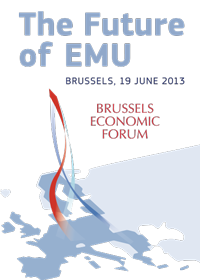
Accessibility tools
Service tools
Language selector
- Current language: en
Navigation path
- European Commission
- Economic and Financial Affairs
- Brussels Economic Forum 2013
- Recordings and photos
Pascal Lamy, Director-General WTO
Leading from the front on EU elections
Pascal Lamy, the current Director General of the World Trade Organisation followed Vice President Rehn's opening with what concerns him the most at this venture in Europe's history: European integration.
Starting his speech in honoring Padoa-Schioppa as an unpretentious and determined man, "who always thought, like Jean Monet, that it was not enough to have ideas, but that you also have to propagate them, plant them in fertile soil". His guiding light and much needed intellectual input is being missed in particular when Europe started suffering its worst crisis of the last 50 years. Yet “further European integration is it still the way forward” Lamy underlines. But, the existential question that all Europeans will confront at the next European elections in 2014 and that political groups must answer is what is the future of the integration project?
The European project must be viewed from an economic point of view the WTO Director General said, but why? Because, “market size does matter” Lamy emphasised, “especially in the capitalist market system we live in whether we like it or not.” making GDP and market size crucial to growth and the future.
Europe's regional integration is the world's most advanced Lamy did not hesitate to praise but global integration is increasing at a most rapid rate of co-operation, within other regions in Asia, in Central America, the Eastern African Communities, Eurasian Customs Union the Trans Pacific Partnership Union, are all moving in this way of co-operation, these are all deeper forms of integration.
The European elections will see citizens focus on their place in the world, and this then becomes a personal issue, not just a trade or market issue, to succeed in European elections and to gear up towards finding a European flame and belief in the European project which he insisted repeatedly is necessary to lead us out of the economic crisis, “we cannot think integration without thinking identity, integration goes hand in hand with values, world wide political integration remains a distant horizon, where Europe still leads the way.”
There are three key areas on how to move forward on this crucial topic, firstly “regain political energy for the EU project, breaking the glass ceiling of legitimacy,” Lamy said.
“Legitimacy is an issue of contention, the European project can only be achieved through greater legitimacy, I don't think this is mainly about constitutional juggling, no, this is about affection, guts, hearts, Europeans simply do not feel that they belong to a community,” Lamy said.
National stereotypes re-appeared with their worst face during the crisis, and affection for the EU project to be re-ignited will require a neutral system from the EU.
“Europe must find a new action to orient its citizens forward, a forward looking narrative which unites Europeans in the belief that their future can be better than their past. Tthis new narrative will not come from the result of leading from behind. It will emerge from explaining, convincing, debating which is the way to accepting...” Lamy says.
“The task ahead is huge, time is short, in May next year Europeans will go to the polls to elect their representatives in the European Parliament. They'll be looking for answers, a sense of direction which has been lacking.”
“European leaders must lead from the front and they must start doing this asap which means as soon as possible.
“The most likely scenario is that for the first time since 1979, when the European Parliament started being directly elected, we will have a strong representation of anti European extremes in the European Parliament, I have absolutely no doubt about this.
“It is a long historical trend that a severe economic crisis always leads to extremes, and mobilisation of the people who are being harmed in their life,” Lamy said.
The only question is whether this will be very strong or moderately strong, “a political debate about the pros and cons of Europe would be good, maybe we've been missing this, building Europe was always seen in a way like supporting the Red Cross in some camps. This has not led to discussion.” Lamy said pointing out that democratic discussion is needed to build a European political system.
Asked on political leadership Lamy emphasises, 'People lead the leaders'.
“It is the people that make politics and unless a new narrative appears that creates a sense that European integration, European identity, and Europe is for tomorrow, not for the past, this is the biggest challenge.”
























